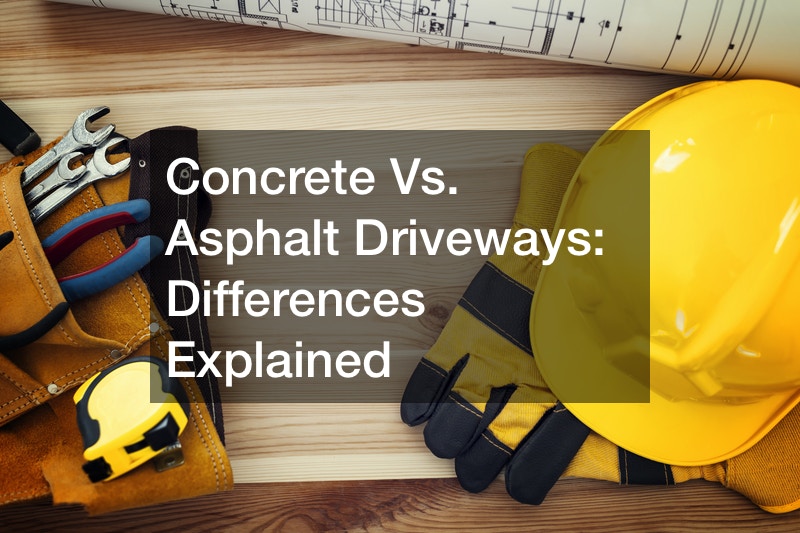Concrete Vs. Asphalt Driveways: Differences Explained


You might be trying to decide between asphalt and concrete. Many people will immediately start by asking: is asphalt cheaper than concrete? If you’re trying to save money, asphalt application might immediately be the better choice for you. You can use an asphalt cost estimator. Asphalt may only cost a few dollars for every square foot. Concrete might cost close to 10 dollars for each square foot.
However, researching other details related to asphalt and concrete can still be helpful, unless you absolutely don’t want to spend money on concrete. Maintaining the asphalt driveway might eventually become comparatively expensive. Concrete driveways are known for their toughness and overall durability. A concrete driveway is less likely to become damaged if a particularly heavy vehicle drives over it, which might be an important consideration for the people who have large trucks, boats, or vans.
An asphalt driveway will usually feel warmer than a concrete driveway, which might cause issues. Chemicals that might gradually cause asphalt to break down won’t affect concrete as much. However, some drawbacks associated with asphalt driveways might be less important in some cases, making them the better choice for you. Paving contractors can help you install the exact driveway that you want.
When it comes time to pave a new driveway or replace an existing one, homeowners typically choose between concrete or asphalt paving. Each material has its own set of advantages and drawbacks, making it a bit more difficult for you to decide on the appropriate option for your property. In today’s post, we’ll discuss some of the considerations to keep in mind before you contact your asphalt or concrete contractors to get started on your residential driveway.
Asphalt Driveways

Concrete may be the most commonly used man-made material, but asphalt is probably a bit more ubiquitous in terms of driveway paving. Of the 2.2 million miles of paved roads in the U.S., around 94% are surfaced with asphalt. A lot of people like the look of the blacktop (and the fact that it provides the appearance of an uninterrupted path from the road to your home). It’s a no-muss, no-fuss option for homeowners who want something simple and straightforward.
Generally, asphalt is well-suited for cooler climates; while concrete can crack in areas that experience extreme cold and ice, asphalt holds up well under these conditions. However, it can be a problem in locations that experience very high temperatures. They also require a bit more maintenance than concrete. Asphalt paving needs to be preserved with a sealant every few years. When properly cared for, asphalt driveways can last for 20 years or so. They’re generally quite affordable, costing anywhere from $2 to $5 per square foot. It’s also easier to repair than concrete driveways.
Concrete Driveways

You might assume that a concrete driveway would look lackluster. But it’s actually quite a bit more versatile. While asphalt is pretty limited in its hue, concrete can be stained, tinted, stamped, or textured to create a totally unique appearance. It turn your driveway into an actual feature, rather than serving as merely a place to park one’s car.
While it does stain more easily than asphalt, concrete doesn’t require as much maintenance and doesn’t have to be sealed (though it can be). Concrete contractors will also point out that this material is actually a bit more durable than asphalt too, which means it won’t need repairs as often. However, as we pointed out above, it’s a bit harder to disguise repairs when they are needed. Concrete driveways generally last longer, as their lifespans range from 30 to 40 years. Concrete driveways may cost a little bit more than asphalt paving will — $3 to $10 per square foot, depending on the customization factors you choose — but many homeowners say the investment is worth it.

Ultimately, this post proves that neither option is inherently better than the other; the best choice for you comes down to your personal preferences and priorities. That’s why it’s often best to work with paving companies that offer both options. We can advise you as to which choice will fit in best with your budget, aesthetics, and other concerns.